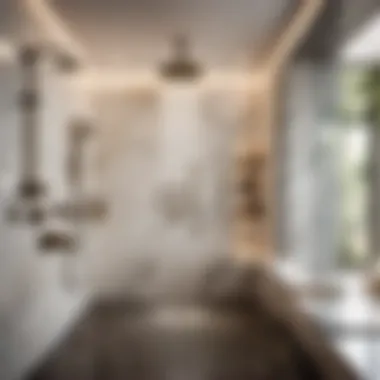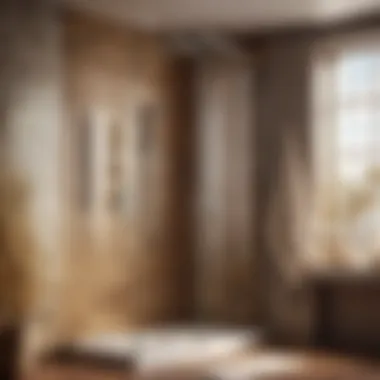The Ultimate Guide to Small Bathroom Shower Remodel Costs


Materials:
When embarking on the journey of remodeling a small bathroom with a shower, it's crucial to have all the necessary materials at hand to ensure a smooth and efficient process. Here is a detailed list of essential materials required for this project:
- Shower kit (including base, walls, and fixtures): In order to install a shower in your bathroom, a quality shower kit is indispensable. Ensure that the dimensions match the space available for installation.
- Tiles: Choose durable and water-resistant tiles for your bathroom walls and floor. Consider the color and design to complement your desired aesthetic.
- Grout and grout sealer: Essential for securing the tiles and preventing water damage over time.
- Shower door: Select a shower door that fits the dimensions of your shower space and aligns with your style preferences.
- Shower fixtures: Include a showerhead, faucets, and handles to complete the shower installation.
- Plumbing materials: Pipes, connectors, and fittings are crucial for connecting water supply to the shower.
- Waterproofing materials: Waterproof membrane, sealant, and caulk to protect the bathroom walls and floor from moisture.
- Tools: Various tools such as a drill, screwdriver, level, tile cutter, and tape measure will be required for the installation process.
Stay tuned for the next sections that will provide detailed instructions on each step of the remodeling journey.
Factors Influencing the Cost of Bathroom Remodeling
When it comes to remodeling a small bathroom with a shower, considering the factors that influence the cost is crucial for effective budget planning. Understanding these factors can help homeowners make informed decisions and avoid unexpected expenses. Factors such as the size of the bathroom, scope of work, and quality of materials play a significant role in determining the overall cost of the renovation project.
Size of the Bathroom
In the realm of small bathroom remodeling, the size of the space directly impacts the cost of the project. Measurement considerations, including square footage and layout intricacies, are vital aspects to evaluate. A smaller bathroom typically involves less material and labor costs compared to a larger one but may present challenges in optimizing space efficiently. Homeowners should carefully assess their bathroom's dimensions to determine the scope of the renovation and allocate a suitable budget.
Scope of Work
Demolition
Demolition is a fundamental part of the remodeling process, involving the removal of existing structures and fixtures. Whether it's tearing down old tiles or dismantling cabinets, the demolition phase sets the foundation for a fresh start. While it can be a messy and labor-intensive task, proper demolition ensures a clean slate for the new design. Homeowners must consider demolition costs in their budget to avoid underestimating the project's overall expenses.
Plumbing
The plumbing aspect of bathroom remodeling is crucial for functionality and efficiency. Updating or rearranging plumbing fixtures such as sinks, showers, and toilets requires professional expertise to ensure proper installation. Quality plumbing work not only enhances the bathroom's performance but also contributes to long-term durability. Homeowners should allocate a sufficient budget for plumbing services to guarantee a seamless renovation process.
Electrical Work
Electrical work plays a vital role in modern bathroom design, encompassing lighting, outlets, and appliance connections. Upgrading electrical systems to meet safety standards and accommodate new fixtures is imperative for a successful renovation. Hiring certified electricians and using high-quality materials prevent potential hazards and ensure reliable power supply. Integrating electrical work into the renovation budget is essential for a functional and secure bathroom environment.
Installation of Fixtures
The installation of fixtures, including sinks, toilets, and showers, requires precision and attention to detail. Proper fixture installation enhances the overall aesthetics and functionality of the bathroom. From aligning pipes to securing fixtures in place, skilled labor is necessary for a professional finish. Homeowners should consider installation costs when planning their budget and seek experienced professionals for a hassle-free remodeling experience.
Quality of Materials
In bathroom remodeling, the quality of materials significantly impacts the longevity and appearance of the space. Choosing high-quality tiles and fixtures ensures durability and aesthetics that withstand the test of time. Homeowners should prioritize quality over cost when selecting materials to achieve a beautiful and functional bathroom.


Tile Quality
Tiles play a prominent role in bathroom design, influencing the room's ambiance and style. High-quality ceramic, porcelain, or natural stone tiles offer durability and visual appeal, enhancing the overall aesthetic of the space. Investing in premium tile materials provides a luxurious finish and minimizes maintenance costs in the long run.
Fixtures
Fixtures such as sinks, toilets, and showers are essential elements of a bathroom remodel, contributing to both form and function. Opting for quality fixtures ensures efficient performance and adds value to the space. Durable fixtures require less maintenance and upkeep, offering homeowners peace of mind regarding their investment. Prioritizing fixture quality in the remodeling budget is key to creating a sophisticated and practical bathroom.
Materials Costs for Bathroom Remodeling
In the realm of renovating bathrooms, material costs play a pivotal role in determining the overall expenses. The selection of materials not only influences the final aesthetic appeal but also affects the durability and functionality of the space being revamped. When contemplating a small bathroom remodel that includes installing a shower, careful consideration of material costs is crucial to stay within budget confines while achieving a desired outcome. Quality materials can significantly impact the longevity and appeal of the bathroom, making it vital to invest wisely.
Tiles
Ceramic
Ceramic tiles are a popular choice for bathroom remodels due to their versatility, durability, and ease of maintenance. The key characteristic of ceramic tiles lies in their water-resistant properties, making them ideal for wet areas like showers. Their affordability and wide range of colors and designs make them a versatile option for various design schemes. Despite their durability, ceramic tiles may be prone to chipping or cracking under heavy impact.
Porcelain
Porcelain tiles are revered for their exceptional strength and resilience, making them an excellent choice for high-traffic areas like bathrooms. The key characteristic of porcelain tiles is their impervious nature, rendering them highly resistant to water, staining, and wear. Their low porosity and ability to mimic natural stone textures make them a sought-after selection for bathroom remodels. However, their installation cost may be higher compared to other tile options.
Natural Stone
Natural stone tiles exude a timeless elegance and unique charm that can elevate the aesthetic of any bathroom. The key characteristic of natural stone lies in its natural variations, offering a one-of-a-kind appeal to each tile. From luxurious marble to rugged slate, natural stone tiles bring a touch of luxury and sophistication to bathroom spaces. However, their maintenance requirements and susceptibility to staining may necessitate regular care and upkeep.
Fixtures
Sink
A sink is a fundamental fixture in any bathroom that not only serves a functional purpose but also contributes to the overall design aesthetic. The key characteristic of a sink lies in its design and functionality, ranging from sleek modern vessel sinks to classic undermount styles. The choice of sink material, size, and style can impact both the visual appeal and practicality of the bathroom.
Toilet
The toilet is a vital fixture in any bathroom remodel, and its selection can influence the comfort and efficiency of the space. The key characteristic of a toilet lies in its flushing mechanism, water efficiency, and design aesthetics. From traditional two-piece toilets to modern wall-hung options, the toilet plays a significant role in defining the overall ambiance of the bathroom.
Shower Fixtures


Shower fixtures encompass a range of components, including showerheads, handles, and valves, that contribute to the functionality and style of the shower space. The key characteristic of shower fixtures lies in their water delivery system, pressure control, and customizable features like massage jets or rainfall showerheads. Selecting high-quality shower fixtures ensures a luxurious and indulgent showering experience, enhancing the overall appeal of the bathroom.
Cabinetry and Countertops
Vanity
A vanity serves as a focal point in most bathrooms, providing storage, counter space, and a decorative element. The key characteristic of a vanity lies in its design, storage capacity, and material composition, ranging from sleek modern vanities with minimalist designs to ornate traditional styles. Choosing a vanity that complements the overall aesthetic and size of the bathroom is essential for a cohesive and functional design.
Storage Cabinets
Storage cabinets are essential for organizing and decluttering the bathroom space while offering additional storage for various essentials. The key characteristic of storage cabinets lies in their capacity, layout, and accessibility, ensuring that they cater to the specific storage needs of the users. From floor-mounted to wall-hung cabinets, the right storage solution can enhance the functionality and visual appeal of the bathroom.
Labor Costs for Bathroom Remodeling
Labor costs play a pivotal role in the overall budget of a bathroom remodeling project. Understanding labor costs is crucial as it encompasses the expenses associated with the skilled professionals who will bring your renovation vision to life. When budgeting for a bathroom remodel, it's essential to factor in labor costs to ensure a realistic financial plan.
Demolition and Removal
Labor charges
Labor charges are a significant component of labor costs in a bathroom remodeling project, covering the expenses related to the demolition and removal of existing fixtures and materials. Hiring professionals for demolition ensures a safe and efficient process, allowing for a smooth transition to the renovation phase. Labor charges for demolition include skilled workers' fees, equipment rental costs, and disposal expenses. While labor charges contribute to the overall budget, they guarantee a seamless start to your bathroom renovation.
Plumbing and Electrical Work
Professional fees
Professional fees for plumbing and electrical work account for a substantial portion of labor costs in a bathroom remodel. Engaging licensed professionals for these critical tasks ensures compliance with building codes and optimal functionality of your bathroom fixtures. Professional fees cover the expertise and experience of skilled plumbers and electricians, along with the costs of materials, permits, and inspections. While professional fees may constitute a significant investment, they ensure the reliability and longevity of your bathroom systems, making them a worthwhile expenditure in your remodeling project.
Installation of Fixtures
Labor charges
Labor charges for the installation of fixtures involve compensating skilled workers for fitting and positioning bathroom elements such as sinks, toilets, and shower fixtures. Efficient and precise fixture installation is essential for the functionality and aesthetics of your renovated bathroom. Labor charges for fixture installation factor in the expertise and precision required for this task, ensuring that every component is properly placed and operational. While labor charges add to the overall labor costs, they contribute to the high-quality outcome of your bathroom remodel, making them a crucial aspect to consider in your renovation budget.
Permit and Inspection Costs
In the realm of bathroom remodeling, permit and inspection costs are crucial considerations that can significantly impact the overall budget. Building permits and inspection fees ensure that the renovation project meets all relevant building codes and regulations, guaranteeing safety and quality in the construction process. Adequate planning for permit and inspection costs can prevent delays, fines, or even the need to redo work, making it a vital aspect of any remodeling project.


Building Permits
Building permits are essential legal documents required for any significant construction or renovation work. Permit fees cover the cost of obtaining these permits, which vary depending on the location, scope of work, and the value of the project. Securing proper permits is non-negotiable when remodeling a bathroom with a shower as it legitimizes the renovation, ensuring compliance with building codes and standards. While permit fees add to the initial expenses of the project, they offer an invaluable layer of protection and accountability throughout the remodeling process.
Permit fees
In the context of bathroom remodeling, permit fees encompass the charges associated with acquiring the necessary building permits for the project. These fees contribute to the legitimacy and compliance of the renovation, guiding the work according to established regulations. The main characteristic of permit fees is their variability, influenced by factors such as project size, complexity, and location. Despite being an additional cost, permit fees are a foundational investment that safeguards the integrity of the remodeling project by ensuring adherence to legal requirements and safety standards. Understanding permit fees is crucial for homeowners embarking on a bathroom renovation with a shower, as they play a central role in facilitating a smooth and lawful remodeling process.
Inspection Fees
Inspection fees are another integral component of permit and inspection costs, focusing on the assessment and approval of completed work. These charges cover the expenses associated with professional inspections carried out by qualified authorities to verify that the remodeling work meets prescribed standards. While inspection fees add to the overall cost of the project, they provide homeowners with reassurance that the renovated bathroom complies with safety and quality benchmarks, offering peace of mind and quality assurance.
Inspection charges
Inspection charges encapsulate the costs of having the remodeling work inspected by official authorities to ensure compliance with regulations. These charges play a critical role in validating the quality and safety of the renovation, emphasizing adherence to established standards. The key characteristic of inspection charges lies in their role as a protective measure, guaranteeing that the completed work meets all necessary requirements. While inspection charges represent an additional financial outlay, they serve as a fundamental aspect of the remodeling process, reinforcing confidence in the project's structural integrity and regulatory compliance.
Additional Costs and Add-Ons
When considering the total cost of remodeling a small bathroom with a shower, it is imperative to account for additional costs and potential upgrades that can enhance the aesthetics and functionality of the space. These add-ons play a crucial role in personalizing the bathroom to suit individual preferences and lifestyle needs, elevating the overall renovation project to new heights.
Lighting Fixtures
Recessed Lighting
Recessed lighting holds a pivotal role in bathroom remodels, offering a sleek and modern lighting solution that helps create a spacious feel by eliminating the need for bulky fixtures. The key characteristic of recessed lighting lies in its ability to provide a clean, unobtrusive source of light that enhances the ambiance without overcrowding the ceiling space. Its flush mount design makes it a popular choice for small bathrooms, contributing to a minimalist aesthetic while maintaining ample illumination levels. However, a potential disadvantage is the complexity of installation, requiring careful planning and positioning to achieve optimal lighting effects within the bathroom.
Vanity Lights
Vanity lights are essential elements in bathroom design, particularly for grooming tasks and adding a touch of elegance to the space. The key characteristic of vanity lights is their ability to offer focused and flattering illumination around the vanity area, ensuring optimal visibility for daily routines. Their popularity stems from the enhanced functionality they bring to the bathroom, serving both practical and aesthetic purposes. Utilizing vanity lights can elevate the overall look of the space while providing ample lighting for daily activities. However, a potential drawback of vanity lights may be related to the choice of fixture styles, as selecting the right design that complements the overall bathroom aesthetics requires careful consideration.
Shower Enhancements
Body Jets
Incorporating body jets into the shower area introduces a spa-like experience, where targeted water streams offer a luxurious massage effect during showers. The key characteristic of body jets lies in their ability to provide customizable water pressure and pattern options, catering to individual preferences for a heightened shower experience. Their popularity arises from the indulgent and therapeutic feel they bring to daily bathing routines, elevating the shower space to a realm of relaxation and rejuvenation. However, a consideration of installation complexity and water usage may slightly outweigh the benefits for some homeowners.
Rain Showerhead
A rain showerhead brings a sense of luxury and tranquility to the bathroom, mimicking the soothing sensation of rainfall for a refreshing shower experience. The key characteristic of a rain showerhead is its wide coverage area, enveloping the bather in a gentle downpour for a sensory escape within the shower enclosure. Its appeal lies in the spa-like ambience it creates, promoting relaxation and unwinding after a long day. The unique feature of a rain showerhead is its ability to transform the shower into a rejuvenating sanctuary, complete with a natural flow of water that adds a touch of opulence to the bathroom. However, one potential drawback could be water consumption, as the indulgent experience may lead to longer shower times.
Heated Flooring
Installation Costs
Heated flooring is a sought-after addition in bathroom renovations, providing warmth and comfort for stepping out of the shower onto a cozy surface. The key characteristic of heated flooring lies in its ability to maintain a comfortable temperature in the bathroom, especially during colder seasons, enhancing the overall showering experience. Its popularity is driven by the luxurious feel it brings to the space, elevating daily routines by eliminating cold tile shock and promoting a spa-like atmosphere in the bathroom. The unique feature of heated flooring is its efficiency in heating the room from the ground up, ensuring a cozy environment without the need for additional heating sources. However, the cost of installation can be a consideration, as it involves intricate work and may increase the overall budget of the renovation project.







